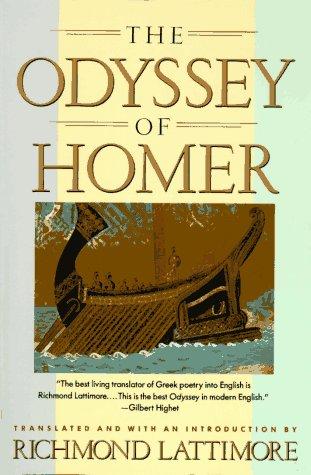Hasn't aged well!
3 steloj
I have finally read a 'proper' edition of Homer's Odyssey albeit in translation, but, still, the famed poetry instead of a retelling. Thank goodness I will (hopefully) never have to do that again!
The Odyssey is such an ancient classic that I am grateful that it exists in the modern day and can be read, but I am also grateful for how much storytelling has advanced over all those centuries! Perhaps this is unfair because, by reading the book instead of going to watch a storyteller perform this work, I know I missed out on much of what must have made the original work vibrant and compelling. Also, contemporary audiences would already have been familiar with the central characters, what men they are and where from, who their parents might be, etc. I found this repeated need to establish everyone's identity and genealogy just a tad tedious, especially once the …
I have finally read a 'proper' edition of Homer's Odyssey albeit in translation, but, still, the famed poetry instead of a retelling. Thank goodness I will (hopefully) never have to do that again!
The Odyssey is such an ancient classic that I am grateful that it exists in the modern day and can be read, but I am also grateful for how much storytelling has advanced over all those centuries! Perhaps this is unfair because, by reading the book instead of going to watch a storyteller perform this work, I know I missed out on much of what must have made the original work vibrant and compelling. Also, contemporary audiences would already have been familiar with the central characters, what men they are and where from, who their parents might be, etc. I found this repeated need to establish everyone's identity and genealogy just a tad tedious, especially once the many gods start getting namechecked too.
The set-piece stories - of the Cyclops or Circe for example - were where The Odyssey really came to life for me, but I was surprised at how little of the poem these adventures account for. Unfortunately they are hidden away amongst a lot of formal chichat and outrageous amounts of eating. Seriously, Homerian men apparently need to eat more often than Hobbits do! And every meal comprises of killing, dismembering and roasting multiple animals then pouring out bowlfuls of wine. These valiant heroes must actually have been unheathily rotund with worryingly high blood pressure! I did enjoy spotting the repeating verses, refrains I suppose, where the poet could have recited almost on autopilot whilst getting their thoughts in line for the next section of the story. For example, these same two characters appear in every good house at dinnertime and I'd love to read The Odyssey from the Grave Housekeeper's point of view:
A maidservant brought water for them and poured it from a splendid and golden pitcher, holding it above a silver basin for them to wash, and she pulled a polished table before them.
A grave housekeeper brought in the bread and served it to them, adding many good things to it, generous with her provisions.
They put forth their hands to the good things that lay ready before them.
Of all the characters, of course, our Odysseus is the most heroic and doesn't he know it! I struggled to understand why Penelope hadn't declared him dead at the earliest opportunity and availed herself of the best of the suitors instead. Odysseus might have suffered terribly, but he is exasperatingly full of his own importance and loves to boast at every opportunity. The ease with which he lies to even his elderly father, Laertes, when there was no reason to do so made me suspect he was making up most of his travails. Margaret Atwood's wickedly wonderful The Penelopiad might also have coloured my opinions!
I can understand why The Odyssey has endured but, for me, the style hasn't aged well. There's too much dull dialogue and I nearly gave up altogether early on before Odysseus even makes his entrance. A richly detailed modern retelling is a more my idea of a satisfying read than the original - and I know I have a copy of Circe by Madeline Miller awaiting me soon!

